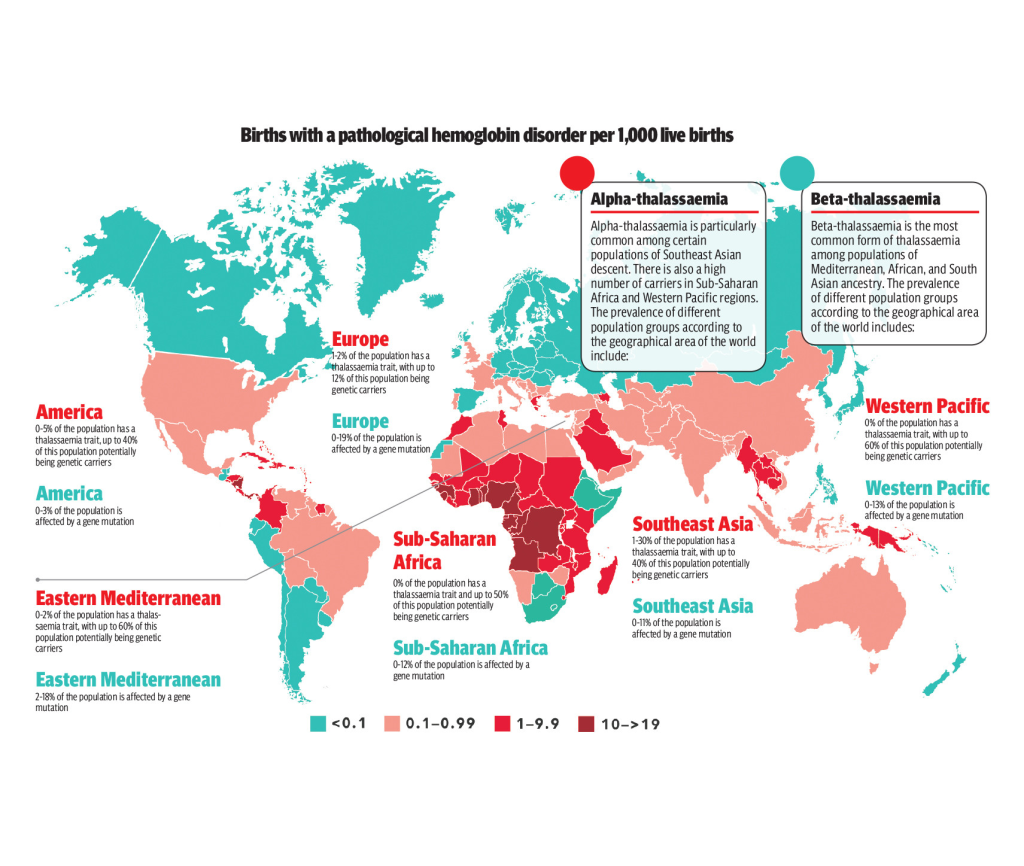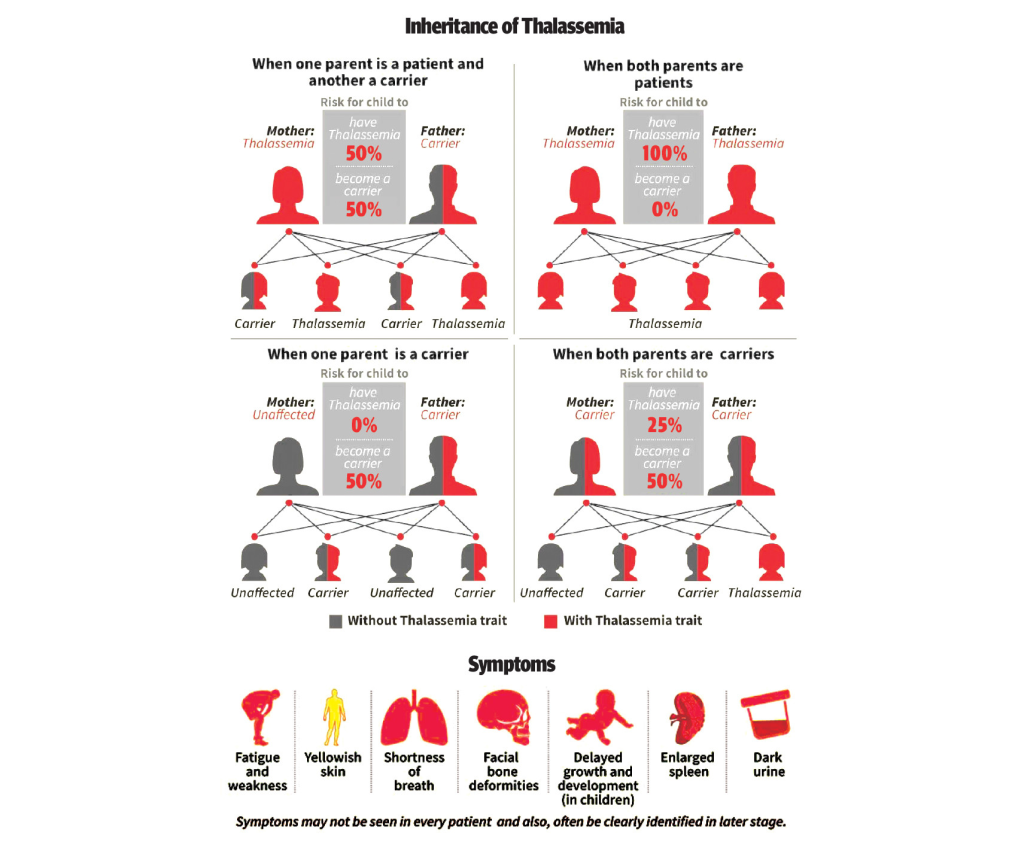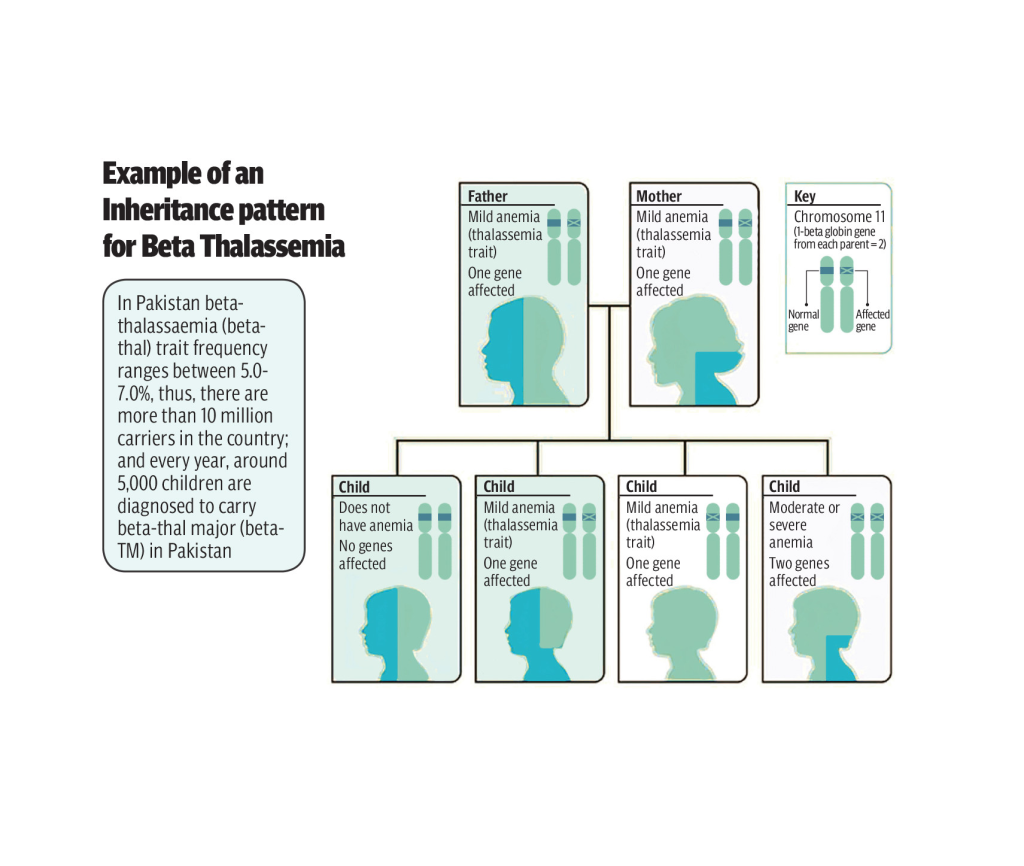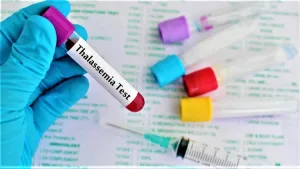When Sara and Ahmed discovered that their six-month-old child had thalassemia major, they were devastated. Further testing revealed that both were carriers of thalassemia minor, something they had never known. Despite living without symptoms, they unknowingly passed the disease on to their child, who now faces a lifetime of regular blood transfusions and medical treatment. The couple was shattered, knowing that any future children they have would also be at risk.
In Pakistan, a developing country, thalassemia affects 11% of the population. The nation accounts for over half of the thalassemia births in the Eastern Mediterranean Region, with about 5,000 children born with the condition each year. Tragically, the average life expectancy for individuals with thalassemia major in Pakistan is just 10 years, largely due to poor healthcare services.
What is Thalassemia?
Thalassemia is a genetic blood disorder that disrupts the production of healthy red blood cells and hemoglobin, resulting in anemia and oxygen deficiency throughout the body. It is an inherited condition, passed from parents to children through gene mutations. The severity of the disease depends on the number of abnormal genes inherited.
There are two primary forms: alpha and beta thalassemia. Beta thalassemia includes two subtypes—thalassemia minor (a less severe form) and thalassemia major, the most serious form, which occurs when a child inherits two faulty beta globin genes, one from each parent.
Individuals with thalassemia minor often show no symptoms but can pass the disorder on to their children. If both parents carry thalassemia minor, each of their offspring has a 25% chance of inheriting thalassemia major, a 50% chance of inheriting thalassemia minor, and a 25% chance of inheriting neither.

The Role of Cousin Marriages
In Pakistan, cousin marriages are a common practice and are a significant factor in the country’s high rate of thalassemia cases. Ayesha Mehmood, diagnosed with thalassemia major at six months old, inherited the condition from her parents, who are thalassemia minor carriers and first cousins. Her two older brothers, also thalassemia major patients, were diagnosed before awareness about the disease became more widespread.
Premarital screening can help prevent the birth of children with thalassemia. However, despite laws promoting premarital thalassemia testing, many couples still neglect to undergo such tests.

Recognizing the Symptoms
The primary symptom of thalassemia is anemia, but other symptoms can include delayed growth, bone deformities, shortness of breath, and frequent infections. It is important for children displaying these signs to be tested for thalassemia. Around 300 million people worldwide carry the thalassemia trait, which means their children are at risk of inheriting the disorder.
In Pakistan, an estimated 10 million people carry the thalassemia trait, with 5,000 babies born each year with thalassemia major. The primary treatment for thalassemia major involves regular blood transfusions, though a bone marrow transplant is the only curative option for children under 10.
The Burden of Blood Transfusions and Iron Overload
Thalassemia patients require blood transfusions, often as frequently as twice a month, which can lead to iron overload—a condition where excess iron builds up in the body and damages vital organs like the heart, liver, and joints. To manage iron overload, patients undergo costly iron chelation therapy to remove excess iron from their bodies. However, the limited availability of voluntary blood donations in Pakistan makes it difficult to arrange regular transfusions.
Living with Thalassemia: Physical and Emotional Struggles
Living with thalassemia involves more than just medical challenges; patients also face emotional and social hardships. Frequent transfusions can leave individuals feeling physically drained, and many struggle with missed school, reduced physical activity, and social isolation. Ayesha Mehmood, now 35 and a leading advocate for thalassemia awareness in Pakistan, recalls the difficulties she faced as a child. Despite the challenges, the support of her family, friends, and teachers made her journey more bearable.

The Importance of a Balanced Diet and Regular Check-Ups
For thalassemia patients, maintaining a balanced diet and attending regular medical check-ups are crucial for managing the condition. A diet rich in protein, fruits, and grains is recommended, though financial constraints often make this difficult for low-income families. Regular monitoring of hemoglobin levels, along with timely transfusions and medications, are essential to prevent complications.
Premarital Screening: The Key to Prevention
As thalassemia is a genetic disease, prevention is the most effective way to reduce its spread. The best preventive measure is premarital screening, ensuring that two thalassemia minor carriers do not marry each other. Pakistan’s Haematology Society strongly advocates for premarital screening to be mandatory and included in the marriage contract (nikkah nama). Though the country has seen proposals for legislation mandating such tests, these bills have not been passed into law.

Raising Awareness and Advocacy
Raising awareness about thalassemia is essential for preventing the spread of the disease. Non-governmental organizations like FAiTh, founded by Mehmood’s parents, play a crucial role in providing support to thalassemia patients through blood donations, medical assistance, and advocacy for premarital testing.
Efforts must continue to promote awareness through public campaigns, mobile phone alerts, and educational programs. As Dr. Rizwan of the Haematology Society of Pakistan suggests, regular awareness messages could be broadcast to help prevent more families from suffering the devastating effects of thalassemia.
Conclusion
Sara and Ahmed’s story is a stark reminder of the importance of awareness and prevention when it comes to thalassemia. If they had known their carrier status, their child might have been spared a lifetime of suffering. Through increased education and mandatory premarital testing, Pakistan can begin to reduce the burden of thalassemia and improve the quality of life for thousands of affected individuals.

ThalassemiaPakistan #GeneticDisorders #PremaritalScreening #BloodTransfusions #ThalassemiaAwareness #IronOverload #CousinMarriages #HealthEducation #PreventiveHealthcare #ThalassemiaMajor #ThalassemiaMinor #PublicHealth #BloodDonations




+ There are no comments
Add yours